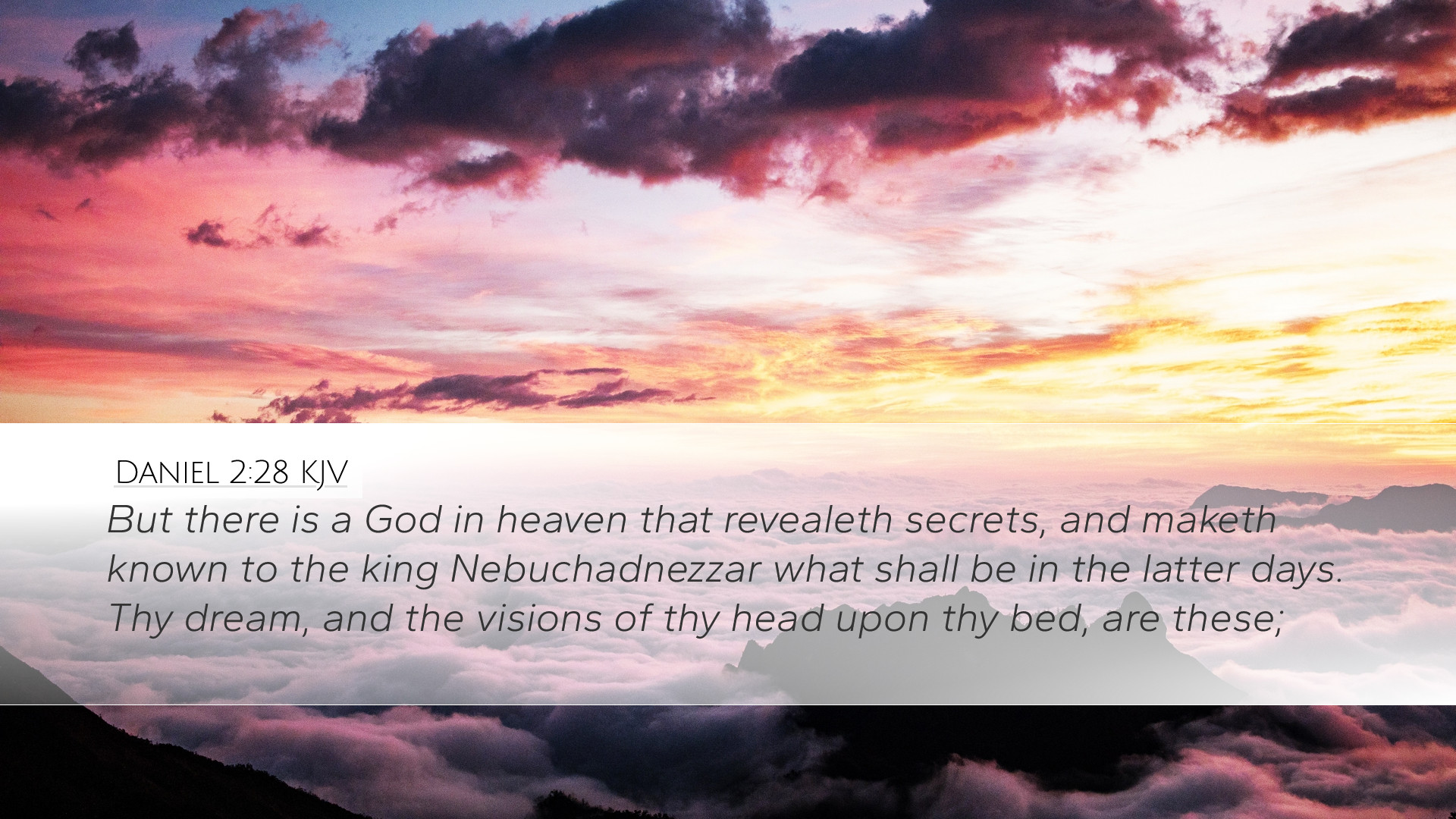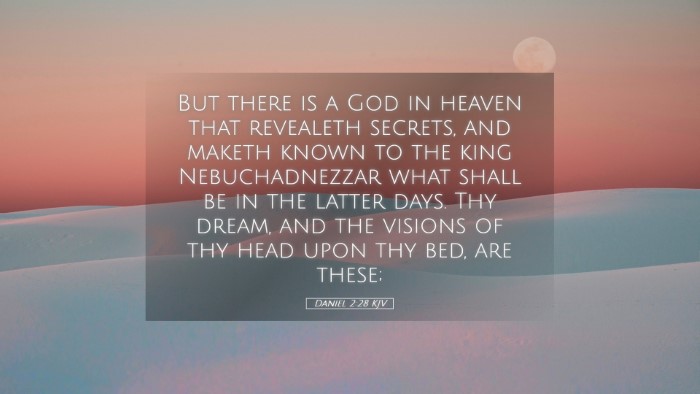Commentary on Daniel 2:28
"But there is a God in heaven that revealeth secrets, and maketh known to the king Nebuchadnezzar what shall be in the latter days. Thy dream, and the visions of thy head upon thy bed, are these."
Introduction
This verse stands at a pivotal moment in the Book of Daniel, where a divine revelation is emphasized. Daniel serves as a prophet and interpreter, demonstrating God's sovereignty and His ability to unveil mysteries. The focus on "secrets" and "visions" is significant, pointing toward themes of divine knowledge that transcend human understanding.
Divine Revelation
According to Matthew Henry, the phrase "there is a God in heaven" asserts the supremacy and authority of God over all earthly kingdoms. It foreshadows the power dynamics in the unfolding narrative where God's knowledge impacts human affairs.
Albert Barnes emphasizes that God's revealing of secrets showcases His omniscience. The mention of "latter days" opens up a prophetic lens through which future events are to be understood, encouraging believers to trust in God's sovereign plan.
Adam Clarke further notes that Daniel's role as an interpreter is significant. His acknowledgment of God's power in revealing secrets serves to glorify God while positioning him as a messenger. It highlights the accountability of leaders like Nebuchadnezzar to heed heavenly wisdom.
The Role of Dreams in Revelation
Dreams in ancient Near Eastern culture often held significant meaning, and this passage indicates that dreams were a conduit for divine communication. Daniel’s interpretation reflects deep theological truths about God’s interaction with humanity.
- Divine Authority: Dreams signify God's direct intervention in human affairs, as observed by Matthew Henry, reaffirming that all authority comes from Him.
- Human Limitations: The inability of the king’s magicians to interpret the dream highlights human frailty and the limitations of worldly wisdom as discussed by Albert Barnes.
- Call to Faith: The revelation aims to strengthen the faith of God’s people, reminding them that God's plans will ultimately prevail against earthly powers.
Theological Implications
This verse serves as a theological cornerstone that encapsulates critical themes about God’s nature, His relationship with humanity, and the unfolding of history according to His will. The following elements merit deeper exploration:
- God's Sovereignty: The assertion that God alone reveals secrets insists on His ultimate control over all events. Matthew Henry suggests that this sovereignty assures believers of God’s active role in their lives.
- Prophetic Insight: The reference to "what shall be in the latter days" introduces prophetic elements, as Albert Barnes suggests, which are crucial for understanding eschatology within the biblical framework.
- Human Response to Revelation: Daniel's humility and reliance on God serve as a model for believers, echoing the sentiment found in Adam Clarke’s commentary that emphasizes prayer and petition as avenues to divine understanding.
Application for Today
For modern believers, Daniel 2:28 reinforces the conviction that God remains actively engaged in the world. In the face of uncertainty, the assurance that God reveals truths remains relevant and comforting. Pastoral applications may include:
- Preaching God’s Sovereignty: Emphasizing God’s control in sermons encourages congregations to trust in His plans.
- The Importance of Spiritual Discernment: Encouraging congregants to seek God's wisdom through prayer, similar to Daniel’s approach, is vital for decision-making amidst life’s challenges.
- Esoteric and Everyday Understanding: Helping believers understand that both great prophetic truths and individual life decisions are under God’s guidance fosters a deep relationship between them and the Divine.
Conclusion
In conclusion, Daniel 2:28 is a profound verse that invites readers to contemplate the mystery of divine revelation. Insights from public domain commentaries illuminate the broader themes of sovereignty, prophecy, and human dependence on God’s wisdom. For pastors, students, and scholars alike, this verse invites ongoing meditation on the nature of God and His engagement with mankind as revealed through dreams, visions, and prophecies.


